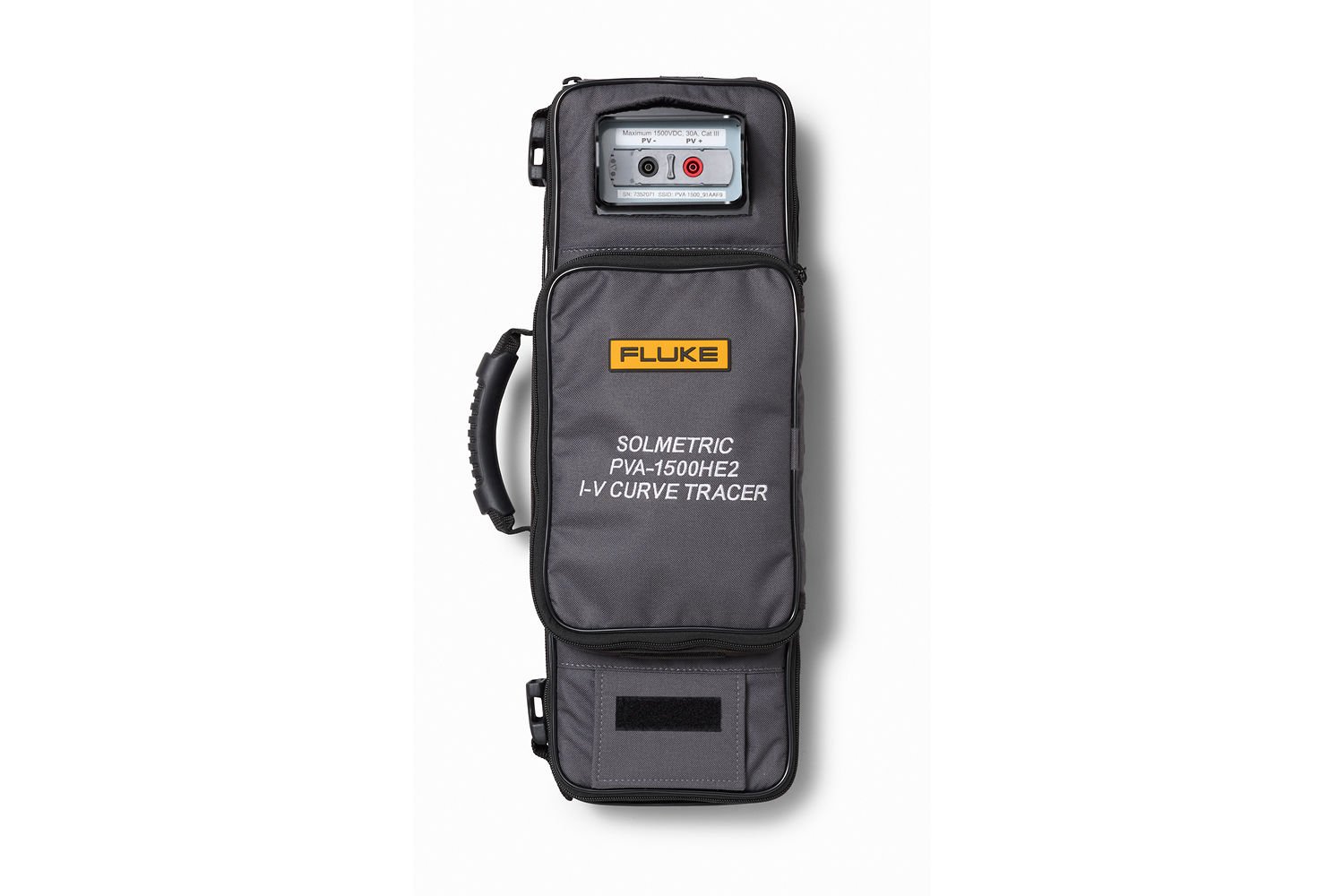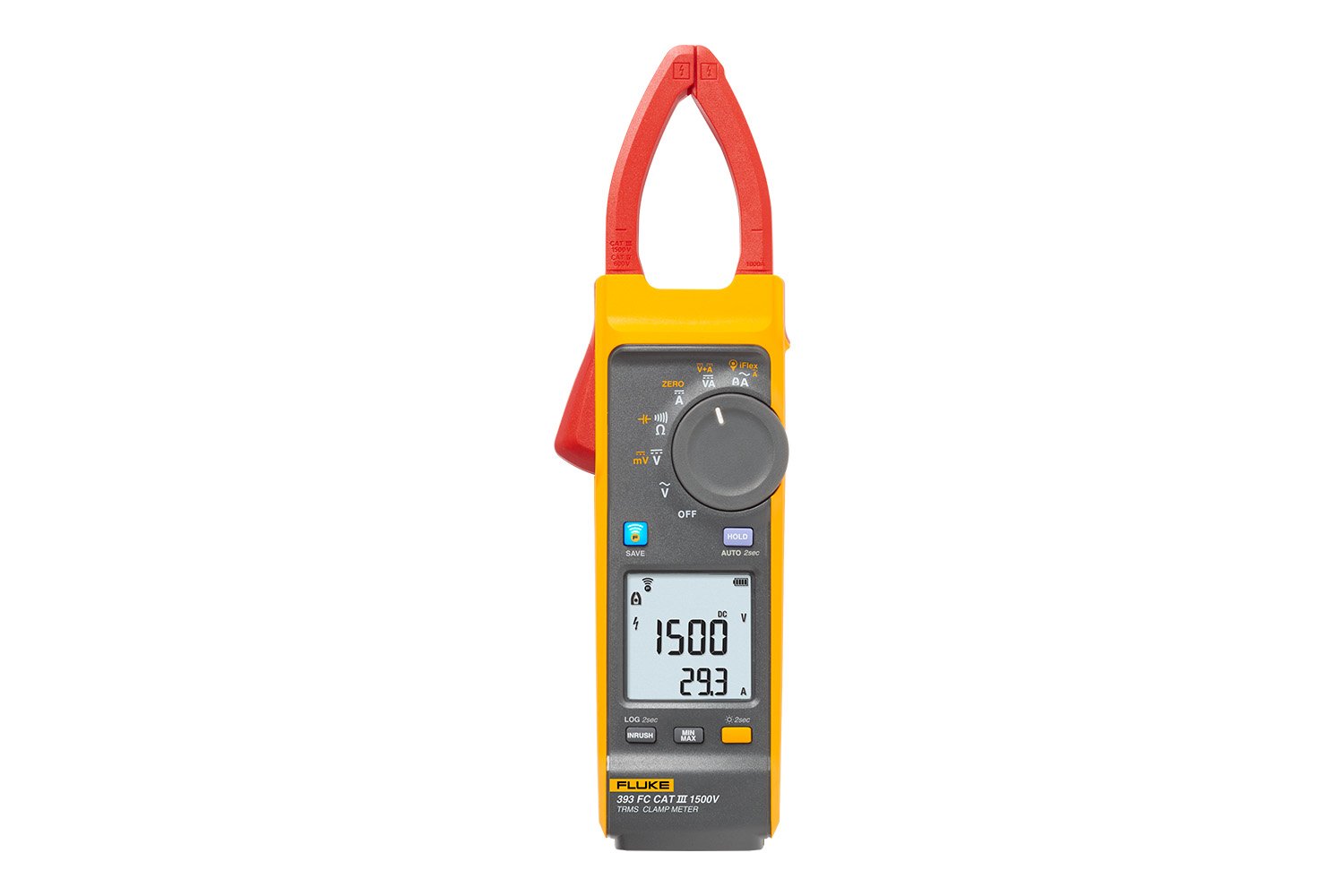Medidor e ferramentas de energia solar para equipamentos de teste fotovoltaicos
Obtenha o verificador de painéis solares e o equipamento de medição adequados para a tarefa
O crescimento da indústria da energia solar requer novas soluções de equipamentos de teste de energia solar para eletricistas, instaladores de sistemas fotovoltaicos e técnicos. A Fluke disponibiliza uma gama de ferramentas especializadas, incluindo medidores e outras ferramentas essenciais de energia solar, para a inspeção, instalação, manutenção e criação de relatórios relativos a instalações de energia solar. Quer esteja a colocar em funcionamento um novo painel fotovoltaico ou a efetuar a manutenção de rotina num parque solar ou numa central fotovoltaica, os equipamentos de teste de energia solar da Fluke têm tudo o que precisa.
Os sistemas fotovoltaicos têm necessidades únicas que requerem ferramentas especializadas para a inspeção, instalação, manutenção e criação de relatórios relativos a instalações de energia solar.
Recursos em destaque para medidores e ferramentas de energia solar
- Como um técnico de painéis solares no telhado garante instalações de painéis de qualidade
- Os 3 principais perigos para a segurança dos sistemas fotovoltaicos e como evitá-los
- Resolução de problemas em sistemas fotovoltaicos: 3 questões comuns
- Os perigos ocultos das falhas de ligação à terra em sistemas fotovoltaicos
As melhores ferramentas de alta tensão de energia solar
Escolha o equipamento de teste de energia solar da Fluke adequado para a tarefa sem comprometer o funcionamento ou a segurança.
O melhor analisador fotovoltaico

Analisador fotovoltaico Fluke da série PVA-1500 com localizador de curvas I-V
A melhor pinça amperimétrica solar

Pinça amperimétrica solar Fluke 393 FC com classificação CAT III 1500 V
Localizador de falhas de ligação à terra em sistemas solares Fluke GFL-1500
O localizador de falhas de ligação à terra em sistemas solares Fluke GFL-1500 é uma ferramenta...
Multímetro digital solar Fluke 283 FC/PV e pinça de corrente sem fios
O multímetro digital solar Fluke 283 FC/PV e a pinça de corrente sem fios, True-RMS CAT III 1500V,...
Multímetro digital Fluke 283 FC CAT III 1500V
O multímetro digital solar Fluke 283FC, True-RMS CAT III 1500V é ideal para sistemas de energia...
Analisador fotovoltaico da série PVA-1500 com kit de localizador de curvas I-V
Meça e visualize curvas I-V até 1500 V/30 A com modelos fotovoltaicos avançados, varrimentos...
Kit de ferramentas solares SMFT-1000: Verificador fotovoltaico multifunções e analisador de desempenho, localizador de curvas I-V Fluke
Concebido para instalação fotovoltaica e testes solares fotovoltaicos para sistemas que operam a...
Medidor de irradiância para inspeção de instalações solares Fluke com suporte de montagem
Medidor de irradiância solar multifuncional, ideal para manutenção e instalações PV.
Medidor de irradiação solar Fluke FLK-IRR1-SOL
Medições de irradiação instantâneas até 1400 W/m2. Inclui leituras de inclinação, bússola e...
Pinça amperimétrica 393 FC True-RMS com iFlex e classificação CAT III 1500 V
Ideal para trabalhar no exterior em painéis solares e sistemas de energia eólica.
Câmara termográfica Fluke Ti480 PRO
A Fluke Ti480 PRO apresenta uma experiência de infravermelhos visual de ponta numa câmara...
Multímetro digital True-RMS Fluke 87V MAX
Revestimento exterior robusto, à prova de poeiras, com classificação IP67 para os locais de...
Pinça de ligação à terra Fluke 1630-2 FC
Teste os componentes de ligação à terra do equipamento em espaços de difícil acesso, incluindo...
Multímetro Digitais Fluke 87 V
Precisão e funções de diagnóstico para a máxima produtividade industrial
Termómetro IV Fluke 64 MAX
O termómetro Fluke 64 MAX tem a exatidão necessária para trabalhar com precisão e não...
Pinça Amperimétrica AC True-RMS Fluke 365
O Fluke 365 é um medidor robust perfeito para trabalhos onde o acesso aos fios é difícil.
Equipamentos de teste de resistência de isolamento Fluke 1507/1503
Os equipamentos de teste de isolamento Fluke 1507 e 1503 são compactos, robustos, fiáveis e...
Multímetro Térmico TRMS Fluke 279 FC
O 279 FC é um multímetro digital com recursos completos e termografia integrada, projetado para...
Conjunto de cabos de teste TLPV1 MC4 de 4 mm da Fluke
Cabos de teste pretos e vermelhos com fichas banana MC4 de 4 mm para medições seguras e fiáveis...
Conjunto de cabos de teste de pinça solar Fluke TLPV2
Medições precisas de energia fotovoltaica CC com conetores Staubli MC4 para testes fiáveis de...
Pinça de corrente sem fios Fluke a283 FC True-RMS CAT III 1500V
A pinça de corrente sem fios Fluke a283FC True-RMS CAT III 1500V simplifica a resolução de...
Conjunto de cabos de teste de pinça solar para sistemas fotovoltaicos Pomona PVLEAD3
Ideal para utilização com pinças amperimétricas solares compatíveis com fichas banana de 4 mm.
Mochila de ferramentas profissional Fluke Pack30
The Fluke Pack30 tool backpack gives you a comfortable hands-free experience vs. traditional tool...
i410 Pinça de corrente CA/CC
The Fluke i410 AC/DC Current Clamp expands the functionality of digital multimeters and measures up...
Kit de verificador solar multifunções Fluke SMFT-1000/LITE
O Fluke SMFT-1000/LITE garante elevados padrões de segurança e proporciona verificações...
Kit Pro de ferramentas solares SMFT-1000: Verificador fotovoltaico multifunções Fluke, localizador de curvas I-V com software TruTest™ e cabos para sistemas fotovoltaicos solares
Kit de solução de testes para sistemas fotovoltaicos multifuncional concebido para instalações e...
Kit PVA-1500HE22500V e verificador de isolamento 1537
Otimização do desempenho solar: Analisador PV PVA-1500HE2 e verificador de isolamento 1537 2500 V
Kit de termografia com localizador de curva I-V PVA-1500HE2
Otimização do desempenho solar: Analisador PV PVA-1500HE2 e câmara termográfica TiS75+
Kit de localizador de curva PVA-1500HE2 I-V, pinça e multímetro
Otimização do desempenho solar: Analisador PV PVA-1500HE2, pinça amperimétrica 393 FC e...
Kit de Localizador de curvas I-V PVA-1500HE2, isolamento, pinça e multímetro
Otimização do desempenho solar: Analisador PV PVA-1500HE2, multímetro de isolamento 1587 FC,...































